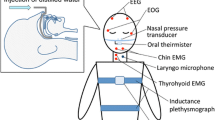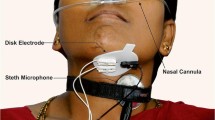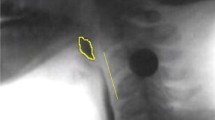Respiratory parameters in 29 normal older subjects (mean age-73 years, SD = 5.7) were studied at rest, during single water swallows, and in continuous drinking. Respiration was recorded by intranasal air pressure changes and the moment of swallowing by pharyngoesophageal manometry. Compared with respiration at rest, respiratory rate increased immediately after 5 mL swallows as duration of breath cycles decreased from a mean of 3.8 s at rest to 3.5 s after swallowing (p = 0.003), but regularity of respiration was maintained. Deglutition apnea showed a trend toward increasing duration from a median of 1.06 to 1.24 s (p = 0.096) as bolus volume increased from 5 to 20 mL. Oxygen saturation levels were also compared, with a median fall of 2% during swallowing, but with larger and unexplained falls in several subjects. Direction of airflow monitoring showed 91% of single 5 mL swallows were followed by expiration, with postswallow inspiratory breaths occurring in 41% of subjects. Continuous swallowing of 100 mL of water from a cup and straw was typically performed with a pattern of multiple swallows per breath, with expiration occurring after 78.5% (cup) and 63.5% (straw) of swallows. This definition of swallowing-induced respiratory changes in normal older people forms a valuable basis for future comparison with elderly dysphagic patients.
Similar content being viewed by others
Author information
Authors and Affiliations
Rights and permissions
About this article
Cite this article
Hirst, L., Ford, G., John Gibson, G. et al. Swallow-Induced Alterations in Breathing in Normal Older People . Dysphagia 17, 152–161 (2002). https://doi.org/10.1007/s00455-001-0115-3
Received:
Accepted:
Issue Date:
DOI: https://doi.org/10.1007/s00455-001-0115-3




